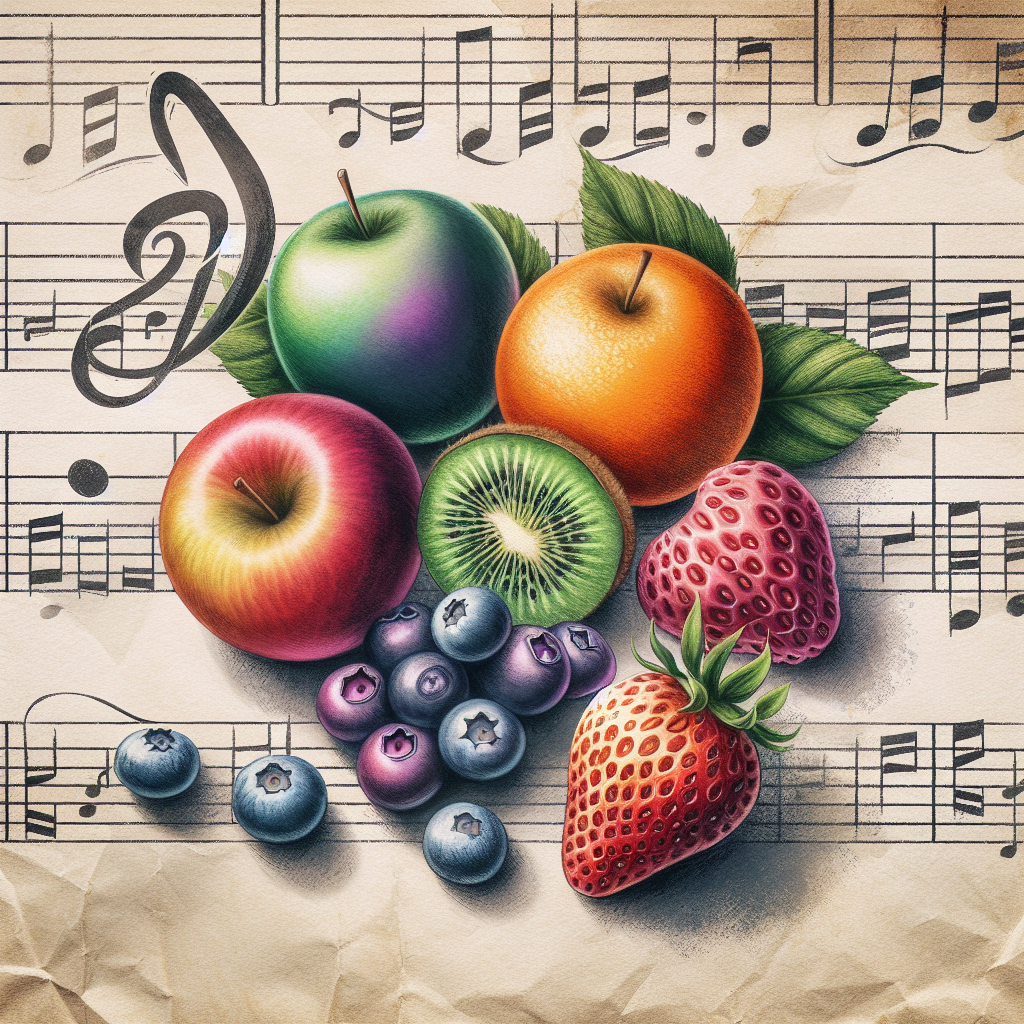The Connection Between Music and Vitamin Intake

Discover the fascinating connection between music and vitamin intake! Uncover how these two seemingly unrelated elements can impact your health and well-being. Visit My Vibrant Vitality now to learn more.
Exploring the Link Between Music Therapy and Vitamin Absorption
Music has long been recognized for its therapeutic properties, with its ability to soothe the mind, uplift the spirit, and even heal the body. However, recent studies have begun to explore a fascinating new dimension of music’s healing power: its potential to enhance vitamin absorption in the body. This intriguing connection between music and vitamin intake is a testament to the profound ways in which our environment can influence our health.
Music therapy, a clinical and evidence-based use of music interventions, has been shown to have numerous health benefits, including stress reduction, pain management, and improvement of cognitive function. It is a holistic approach to health that addresses the physical, emotional, cognitive, and social needs of individuals. The therapeutic effects of music are believed to be mediated by its ability to stimulate the release of certain hormones and neurotransmitters, which can influence various physiological processes, including digestion and nutrient absorption.
The human body requires a variety of vitamins to function optimally, and these vitamins must be absorbed from the food we eat. The process of vitamin absorption is complex and can be influenced by many factors, including the state of our digestive system, the composition of our diet, and our overall health status. Interestingly, research suggests that our emotional state can also affect vitamin absorption. Stress, for example, can impair the absorption of nutrients and lead to vitamin deficiencies. Conversely, positive emotions, such as those elicited by music, can enhance nutrient absorption.
A study published in the Journal of the Association for Psychological Science found that listening to music can stimulate the release of dopamine, a neurotransmitter associated with feelings of pleasure and reward. Dopamine can enhance the function of the digestive system and improve nutrient absorption. This suggests that music therapy could potentially be used as a natural and non-invasive way to enhance vitamin absorption and improve nutritional status.
Moreover, music has been found to have a positive effect on the immune system. A study published in the journal Brain, Behavior, and Immunity found that listening to music can increase the levels of certain antibodies in the body, which play a crucial role in the immune response. These antibodies are proteins that help the body to fight off infections and diseases. They are also involved in the absorption of certain vitamins, such as vitamin A, which is essential for the health of the eyes and skin, and vitamin D, which is important for bone health.
In conclusion, the connection between music and vitamin intake is a fascinating area of research that holds great promise for the future of health and wellness. While more research is needed to fully understand the mechanisms underlying this connection, the existing evidence suggests that music therapy could potentially be used as a complementary approach to enhance vitamin absorption and improve overall health. This underscores the importance of a holistic approach to health that recognizes the interconnectedness of our physical, emotional, and environmental wellbeing. So, the next time you sit down for a meal, consider putting on some of your favorite tunes. Not only will it make your meal more enjoyable, but it could also help your body to absorb more of the vital vitamins it needs to stay healthy.
The Impact of Music on Vitamin Intake and Overall Health

Music has long been recognized for its profound impact on human emotions and cognitive processes. However, recent studies suggest that the influence of music extends beyond the realm of mental health, potentially affecting physical health, specifically vitamin intake and overall wellness. This intriguing connection between music and vitamin intake may seem far-fetched at first glance, but a closer look reveals a fascinating interplay of psychological and physiological factors.
The relationship between music and vitamin intake is primarily mediated through the impact of music on mood and stress levels. Music, with its soothing melodies and harmonious rhythms, has been proven to reduce stress and anxiety, which are known to negatively affect the body’s ability to absorb and utilize vitamins. When we are stressed, our bodies produce a hormone called cortisol, which can interfere with the absorption of essential nutrients, including vitamins. By reducing stress levels, music can indirectly enhance the body’s vitamin absorption capacity.
Moreover, music can also influence our eating habits, which in turn, affects our vitamin intake. A study published in the journal “Appetite” found that listening to soft, slow music during meals can slow down the rate of eating, leading to increased satiety and reduced food intake. This mindful eating can result in a more balanced diet, which is likely to be rich in essential vitamins and minerals.
Music therapy, a growing field in healthcare, is also contributing to this connection. Music therapists use music-based interventions to help patients manage stress, improve mood, and promote overall well-being. These positive effects can indirectly boost the body’s ability to absorb vitamins by improving digestive health and reducing stress-related disruptions in nutrient absorption.
Furthermore, the impact of music on sleep patterns cannot be overlooked. Numerous studies have shown that listening to calming music before bedtime can improve sleep quality. Good sleep is crucial for the body’s vitamin absorption process as it is during this time that the body repairs and regenerates cells, a process that requires various vitamins. Therefore, by improving sleep quality, music can indirectly enhance vitamin intake.
However, it’s important to note that while music can potentially enhance vitamin intake and overall health, it is not a substitute for a balanced diet and a healthy lifestyle. Regular consumption of a variety of fruits, vegetables, lean proteins, and whole grains is essential to ensure adequate intake of all necessary vitamins. Regular exercise, adequate sleep, and stress management are also crucial for optimal health.
In conclusion, the connection between music and vitamin intake is a fascinating area of research that underscores the holistic impact of music on human health. By reducing stress, promoting mindful eating, enhancing sleep quality, and supporting overall well-being, music can potentially enhance the body’s ability to absorb and utilize vitamins. However, more research is needed to fully understand this complex relationship and to develop music-based interventions that can be used to promote vitamin intake and overall health. Until then, it wouldn’t hurt to enjoy your favorite tunes while savoring a nutritious meal or winding down for the night.
Harmonizing Health: The Surprising Connection Between Music and Vitamin Intake
Music has long been recognized as a powerful tool for healing and wellness. Its ability to soothe the mind, uplift the spirit, and even stimulate physical healing is well-documented. However, a surprising connection has recently been discovered that links the therapeutic effects of music with something seemingly unrelated: vitamin intake. This intriguing correlation between music and vitamin intake offers a fresh perspective on how we can harmonize our health.
The connection between music and vitamin intake is rooted in the body’s physiological responses to both. When we listen to music, our brain releases dopamine, a neurotransmitter associated with feelings of pleasure and reward. This release of dopamine not only makes us feel good but also stimulates various bodily functions, including digestion and absorption of nutrients.
On the other hand, vitamins, particularly B-complex vitamins, play a crucial role in maintaining our brain health. They aid in the production of neurotransmitters like dopamine, serotonin, and norepinephrine, which are essential for mood regulation and cognitive function. Therefore, a deficiency in these vitamins can lead to mood disorders and cognitive decline.
So, how exactly does music influence vitamin intake? The answer lies in the stress-relieving properties of music. Chronic stress is known to impair the body’s ability to absorb nutrients effectively. By reducing stress levels, music can enhance the body’s nutrient absorption capacity, including the absorption of essential vitamins.
Moreover, music can also influence our eating habits. Research has shown that listening to slow-tempo music can lead to decreased food intake, while fast-tempo music can increase it. This suggests that music can be used as a tool to control overeating or undereating, both of which can lead to vitamin deficiencies.
The connection between music and vitamin intake extends beyond physiological responses. It also involves psychological and emotional factors. Music has the power to evoke emotions and memories that can influence our food choices. For instance, a song that reminds us of a happy family gathering might make us crave the nutritious home-cooked meals we had during that event.
Furthermore, music therapy is increasingly being used in clinical settings to improve patients’ nutritional status. For example, in patients with eating disorders, music therapy has been found to reduce anxiety and improve their relationship with food, leading to better vitamin intake.
In conclusion, the connection between music and vitamin intake is a fascinating area of study that offers promising implications for health and wellness. By leveraging the power of music, we can potentially enhance our vitamin intake and overall health. However, it’s important to remember that while music can aid in nutrient absorption and promote healthy eating habits, it’s not a substitute for a balanced diet rich in vitamins and minerals.
The harmonious relationship between music and vitamin intake underscores the importance of a holistic approach to health. It reminds us that health is not just about what we eat, but also about how we live, including the music we listen to. So, the next time you reach for your vitamins, consider pairing them with your favorite tunes for a potentially enhanced health benefit.